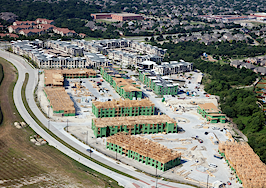In these times, double down — on your skills, on your knowledge, on you. Join us Aug. 8-10 at Inman Connect Las Vegas to lean into the shift and learn from the best. Get your ticket now for the best price.
When I began my real estate career four decades ago, we didn’t make deals overnight. We scheduled site visits, obtained cashier’s checks from brick-and-mortar banks, snail-mailed (or overnighted, to be expeditious) documents, and attended in-person closings. All this required weeks or months to close deals, because technology had not yet automated these processes.
Today, I employ Google Maps, virtual tours and closings, e-signatures, and online payment systems to bring scale and speed to deal-making. These and other tools deliver agility, a fundamental characteristic to successful real estate investing whether you’re buying a 1,000-square-foot house or a 1,000,000-square-foot commercial building.
Success in real estate investing hinges on defining the edges — in conducting research, sourcing opportunities, locating capital and closing the deal. That applies to every branch of real estate, from single-family housing to commercial to my current pursuit, multi-family housing.
Successful real estate investors hold a common set of core characteristics. They’re focused, analytical and resilient. They’re patient and understand negotiations. They build networks, relate to people and embrace tech. They’re agile and willing to change.
Recently, I met with a young entrepreneur who sought advice on becoming a real estate investor. Without promising success, or even necessarily defining it, I outlined some strategies that I used (and still do) to build a private equity real estate company. Here’s what I shared.
Have a purpose and find your niche
Real estate investing offers a tempting array of options. Do you want to be an active or passive investor? Are you interested in residential or commercial? Are you a long-term investor or a micro-flipper? For new investors, these options can be overwhelming, leading to confusion, exasperation and potential mistakes.
Before you begin investing, define your purpose. Entrepreneurs seeking to build careers must pursue investing from a different lens than passive investors seeking secondary income. In multifamily housing, for instance, investors have to understand markets and submarkets, renter demographics, occupancy trends and property demands.
Having a purpose also means finding a niche. In 2006, I published the book, Profit by Investing in Student Housing, which led investors through the opportunities created by too many students and too little campus housing. Investors can find niche options almost anywhere.
Today, investors are looking at reclaiming office space, empty or downsized during the pandemic, for other uses. They’re investing in self-storage properties that don’t require repairs or renovations. And they’ve noticed that 42 percent of renters live in single-family homes, according to the U.S. Census Bureau data, which leads to a current niche I’m pursuing.
My company recently acquired an 87-home, single-family rental community in Knoxville, Tennessee, a high-demand rental market. Single-family rentals and build-to-rent developments represent growing branches of the multifamily market, and we’re committed to developing our place in that niche. As you grow in your real estate career, find your niche.
Start small and regionally
Successful real estate investors have a developed sense for executing deals and sourcing capital. Few accomplish this overnight. Time, failure, recovery and self-assessment lead to success. Little wonder that 71 percent of real estate investors are 40 or older, according to Zippia, and the average age of a real estate agent is 56, according to NAR. The business produces long-term calluses that make us better.
The best way to cultivate calluses is in increments. New real investors should start small; source deals that are manageable from a financial and professional perspective. Buy a single-family house, add value through renovation, and either resell or generate income through rent. Investors interested in multi-family housing should consider smaller properties, perhaps with three to six units to manage.
Starting small also means starting locally. Yes, we can scout properties worldwide with ease, but new investors should train their focus on a city or region. Get to know the neighborhoods. Find emerging submarkets and walk them day and night, looking for high-demand locations needing inventory.
The key is finding properties that project as executable deals. To do this, you have to touch the properties, perhaps even begin as a hands-on manager.
One thing I’ve learned about real estate investing is this: It’s often more difficult to find good deals than the capital to fund them. By starting small, you’ll build a reputation for successfully executing deals, which money then finds.
Be a good study
Did you know that nearly half of the 49.5 million U.S. rental units are located in small properties (one- to four-unit buildings)? Or that median monthly U.S. rental receipts increased by 25 percent from 2018 to 2021? Or that 82 percent of all rental units have off-street parking?
The U.S. Census Bureau’s Rental Housing Finance Survey compiles a database of property information essential in multifamily real estate. We use the database, along with other vital U.S. Census information, to analyze demographic trends, determine rental rates, and source new deals.
Other resources, such as CoStar for commercial real estate, provide valuable, real-time data to guide decision-making. We rely on the tools of data-driven real estate, to which many new investors are drawn, while employing the timeless techniques of success.
For instance, new investors must learn the fundamentals of income and expense statements. They need to understand the impact of ongoing insurance costs, how to fold water and sewer costs and pet fees into rents, and how much to pay for kitchen renovations. They need to grow comfortable in non-traditional markets. Further, they need to study capital creation.
Crowdfunding marketplaces such as CrowdStreet, Fundrise and RealtyMogul link developers and investors, changing how we generate capital and make deals. As Fundrise states on its website, technology is disrupting the status quo. Though we’ve yet to use crowdfunding, we’re intrigued with it as a capital source and encourage new investors to make it part of their research. But as with all homework, some fundamental principles apply.
Ultimately, real estate investors achieve success by establishing a track record. They take time to develop credibility and sound judgment, which bigger investors notice. They acquire scale by executing deals through changing environments. Above all, they grow big by starting small. For aspiring real estate investors, that’s my best advice: Your first step in real estate doesn’t need to be a giant leap.
Michael H. Zaransky is the founder and managing principal of MZ Capital Partners in Northbrook, Illinois. Founded in 2005, the company deals in multifamily properties.













